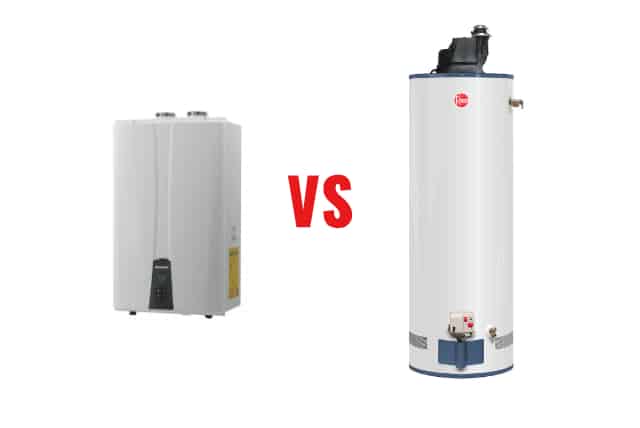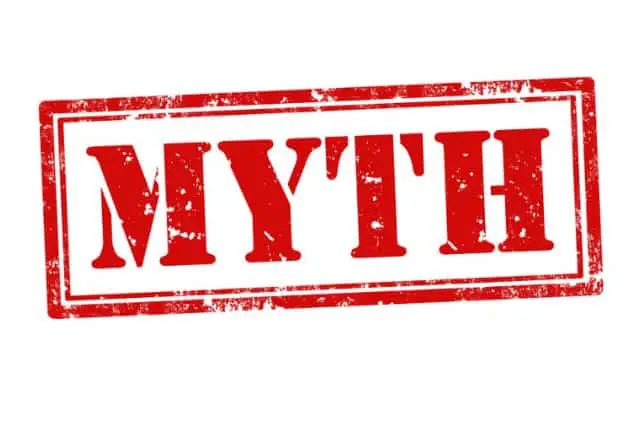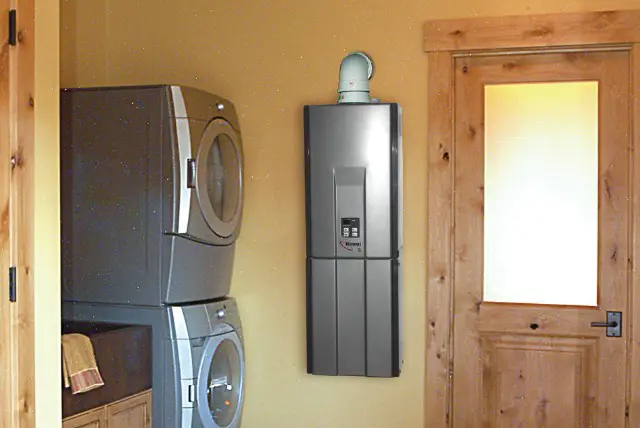
I love to flip houses, but my market has been super saturated with competition. So, for the last few years I’ve exclusively flipping and investing in mobile homes.
I’ve been considering installing a tankless water heater in one of the homes, and I thought I’d share what I learned from my research..
Table of Contents
How much energy and cost savings can be expected by using a tankless water heater in a mobile home over a traditional water heater?
The amount of energy and cost savings that can be expected by using a tankless water heater in a mobile home over a traditional water heater depends on several factors such as the size of the mobile home, the hot water usage patterns, and the energy source used.
In general, tankless water heaters are more energy-efficient than traditional water heaters because they only heat water on-demand, rather than keeping a large tank of water constantly hot. This means that they use less energy to heat water, resulting in lower energy bills.
According to the U.S. Department of Energy, tankless water heaters can be up to 34% more energy-efficient than traditional water heaters for homes that use less than 41 gallons of hot water per day. However, for larger homes with higher hot water demand, the energy savings may be lower.
In terms of cost savings, the initial cost of purchasing and installing a tankless water heater is typically higher than that of a traditional water heater. However, over time, the energy savings can offset the initial investment and result in long-term cost savings.
Overall, the energy and cost savings that can be expected by using a tankless water heater in a mobile home depend on the specific circumstances and usage patterns
So, Can a Tankless Water Heater Be Installed in a Mobile Home?
Yes, you can add a tankless water heater to a mobile home, but you need to find out what on-site gas or electric changes need to be made in order for your home to accept the tankless water heater. You also need to consider your local climate when determining where to install the water heater.
Tankless water heaters are becoming more and more popular because they offer many great benefits to homeowners. However, there are also some misconceptions about theme out there that I wanted to share with you.
Before you attempt to install a tankless water heater in your mobile home, here are some important points that I’ll be covering:
- Myths About Tankless Water Heaters
- Benefits of Tankless Water Heaters
- Gas Water Heater Needs
- Electric Water Heater Needs
- How Your Climate and Surroundings Affect Where You Can Install Your Water Heater
A quick side note that I’ll address a little more later in this post. Installing a tankless water almost always requires changes to your home. These changes will vary depending on whether or not you have an electric or gas water heater. These changes can be quite costly, and they may deter you from installing a tankless water heater.
Myths About Tankless Water Heaters

My conversations with homeowners and my online research taught me that there are some misconceptions about tankless water heaters.
Myth 1: Tankless Water Heaters Offer Instant Hot Water
This is actually false. When it comes to instant hot water, there’s really no difference between tankless or tank water heaters. This is because cold water will run until the heated water reaches the faucet you’re using.
Myth 2: Tankless Water Heaters are Maintenance Free
This too is false. Both tank and tankless hot water heaters need to be flushed at least once a year to remove sediment deposit build up from using hard water. In fact, many tankless water heater manufacturers suggest flushing your heater every 6 months.
However, if your home uses a water softener prior to the water heater, then this removes much of the need for maintenance. Soft water doesn’t have sediment deposits, so there isn’t any build up to be removed.
Benefits of Tankless Water Heaters
Despite the possible need for slightly more maintenance, there are plenty of benefits of tankless water heaters. Here are the best reasons you might want to install one in your home.
Benefit 1: Savings
Money, money, money! Well, a little extra anyway, but every little bit helps. Tankless water heaters only use energy when you’re trying to use hot water. Tank water heaters use energy to constantly keep the tank full of hot water available for you to use when needed. Over the course of a year, you’ll likely save 20-30% on your utility bill.
Benefit 2: Energy Efficiency
The efficiency of a water heater also impacts your savings. This just means, of the gas or electricity used for the water heater, how much is actually used by the water heater. I was surprised by how much energy is lost by tank water heaters.
Tankless water heaters typically have an efficiency rating of 0.8 – 0.9. This means that for every $1 of gas or electricity put into the unit, $0.80 – $0.90 is transferred into hot water. Tank water heaters typically have an efficiency rating of 0.5 – 0.6. So, only $0.50 – $0.60 is being transferred to hot water with these. Unbelievable!
Benefit 3: Near Limitless Hot Water
This is my personal favorite benefit because I love endless hot showers! You probably already know why you get limitless water with a tankless water heater if you’re looking this up, but here’s a brief explanation.
Tank water heaters store hot water for later use. Once the hot water from that tank is used, then you have to wait for it to heat more water. However, a tankless water heater as a heating element that heats up the water as it comes through near instantly. This offers you a continual stream of glorious hot water!
Benefit 4: Space Savings
Sometimes space can be a premium in mobile homes, so any space saved tends to really help out. We’ll talk more about interior versus exterior water heaters later in the post, but either way, you’ll have more space for other storage items.
Benefit 5: Lifespan
Doesn’t everyone prefer things to last longer? Well, tankless water heaters last significantly longer than their tank counterparts. Tank water heaters tend to last 10 to 15 years and tankless water heaters tend to last 20 to 25.
These time frames assume that you’re using hard water in your home and that you’re flushing your water heater at the recommended intervals. With soft water both types of water heaters can last much longer.
Benefit 6: Improved Water Quality
Tankless water heaters do not store hot water, which can help reduce the risk of bacteria growth and improve water quality.
Benefit 7: Reduced Risk Of Water Damage
Traditional water heaters are susceptible to leaks and can cause significant water damage in a mobile home. In contrast, tankless water heaters do not store large amounts of water, reducing the risk of water damage from leaks.
Mobile Home Specific Tankless Water Heater Considerations

When looking into tankless water heaters, ask the manufacturers if they have any HUD approved options for manufactured homes. Not all tankless water heaters are meant for mobile homes.
Once you find a HUD approved model, you’ll need to choose an interior or exterior model. More on that later, but if you choose an interior model, HUD has stated that they can be installed in any room. However, the room must have a direct vent to the outside and it must walls and ceiling made from 5/16” or more thick gypsum board. Also, electric models require a dedicated circuit.
How Your Climate and Surroundings Affect Where You Can Install Your Water Heater

Should you get an interior or exterior water heater? Well, that depends on the climate where you live. I live in the arid wasteland of southern Arizona, so I don’t have to worry about freezing temperatures too often. If you rarely having freezing temperatures, then you’ll likely be able to install your tankless water heater outside. This is handy because it is easier to flush when needed.
If you’re blessed enough to have four seasons, then you likely need to install the water heater inside. It’ll likely go in the same spot as your current tank water heater, but it’ll just take up less space.
Gas Water Heater Needs
Before buying a tankless water heater it will be important to find out what size gas supply line you have at your home and if it will accommodate the new water heater. I was able to get this information from my local gas company.
Simply put, the gas supply line must be properly sized to the water heater. If it isn’t, then the water heater won’t have enough fuel to run properly. This can lead to a number of problems down the road.
Electric Water Heater Needs
Just as with gas water heaters, electric water heaters also have special needs. Most homes will require new breakers to allow for higher amperage. I called around to a few electricians to ask some general questions about what I’d likely need to do to prepare for installing a tankless water heater.
I was able to get a ballpark cost of what it was going to take to get the updates done. Of course, these numbers will vary depending on where you’re at in the country and when you’re reading this. In my case, the cost was about one-third the cost of the water heater.
Related Questions
Are there different types of tankless water heaters?
Yes, there are 3 types of tankless water heaters: 1) Non-condensing, 2) Condensing, and 3) Condensing hybrid. The differences primarily affect materials needed for the heat exhaust and price.
Non-condensing water heaters are the original form of tankless water heaters. They are reliable and proven. They units are also cheaper, but they require expensive stainless steel venting. They are the least efficient with an EF rating of 0.82 – 0.85, but that’s way better than tank water heaters.
Condensing water heaters are starting to replace non-condensing water heaters because they can use cheaper PVC venting. They’re also more efficient with an EF rating of 0.92 – 0.94. However, they are more expensive than non-condensing.
Condensing hybrid water heaters are the new kids on the block. They have a slightly better EF rating than condensing because they have a small on board tank. This tank makes short water draws (small usage situations) more efficient. Their EF rating is 0.92 – 0.96. They also can use PVC venting.
How do you decide which size water heater to get?
Tankless water heaters aren’t sized by gallons because they usually don’t store on board water. They’re measured by flow rate (gallons per minute – GPM) and temperature rise (referring to how far the temperature of incoming water needs to rise). Imagine a situation in which you need to have all of your hot water appliances on at the same time and use that to guage your needs. The table below will show you what GPM rating each appliance needs.
| Appliance | Flow Rate (GPM) |
| Kitchen Faucet | 1.5 |
| Dishwasher | 1.5 |
| Bathroom Faucet | 0.5 – 1.5 |
| Shower | 1.0 – 2.0 |
| Clothes Washing Machine | 2.0 |
Thanks for reading the post!

